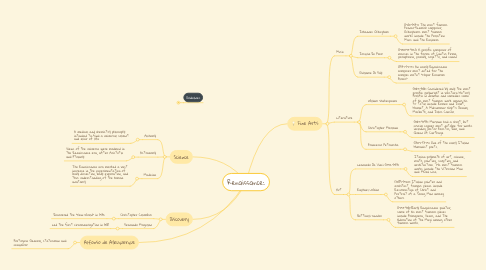
1. Alfonso de Albuquerque
1.1. Portugese General, statesman and conqueror
2. Guidelines
2.1. Anything goes!
2.2. No criticism or flaming allowed
2.3. The Wilder The Better
2.4. Quantity is Quality
2.5. Set a Time Limit
3. Science
3.1. Alchemy
3.1.1. A medical and chemistry philosophy intended to find a universal solvent and elixir of life
3.2. Astronomy
3.2.1. Views of the universe were modeled in the Renaissance era, after Aristotle and Ptolemy
3.3. Medicine
3.3.1. The Renaissance era marked a vast increase in the experimentation of body dissection, body exploration, and thus understanding of the human anatomy.
4. Discovery
4.1. Christopher Columbus
4.1.1. Discovered the "New World" in 1492
4.2. Fernando Magellan
4.2.1. Led the first circumnavigation in 1518
5. Fine Arts
5.1. Music
5.1.1. Johannes Ockeghem
5.1.1.1. (1410-1497) The most famous Franco-FLemish composer, Ockeghem's most famous works include the Prolation Mass and the Reqiuem
5.1.2. Josquin De Prez
5.1.2.1. (1450/55-1521) A prolific composer of masses in the forms of Cantus Firma, paraphrase, parody, sogetto, and canon
5.1.3. Guillame Du Fay
5.1.3.1. (1397-1474) An earliy Renaissance composer most noted for the complex motet "Nuper Rosarum Flores"
5.2. Literature
5.2.1. William Shakespeare
5.2.1.1. (1564-1516) Considered by mny the most prolific playwright in Western History. Prolific in dramas and comedies some of his most famous work among his 37 total include Romeo and Juliet, Hamlet, A Midsummer Night's Dream, Macbeth, and Julius Caesar.
5.2.2. Christopher Marlowe
5.2.2.1. (1564-1593) Marlowe had a short, but crucial career most notable for works including Doctor Faustus, Dido, and Queen of Carthage
5.2.3. Francesco Petrarcha
5.2.3.1. (1304-1374) One of the early Italian Humanist poets.
5.3. Art
5.3.1. Leonardo Da Vinci (1452-1519)
5.3.1.1. Italian polymath of art, science, math, painting, sculpting, and architecture. His most famous works include the Vitruvian Man and MOna Lisa.
5.3.2. Raphael Urbino
5.3.2.1. (1483-1520) Italian painter and architect, famous pieces include Resurrection of Christ and Portrait of a Young Man among others
5.3.3. Botticelli Sandro
5.3.3.1. (1445-1510)Early Renaissance painter, some of his most famous pieces include Primavera, Venus, and The Adoration of the Magi among other famous works.

